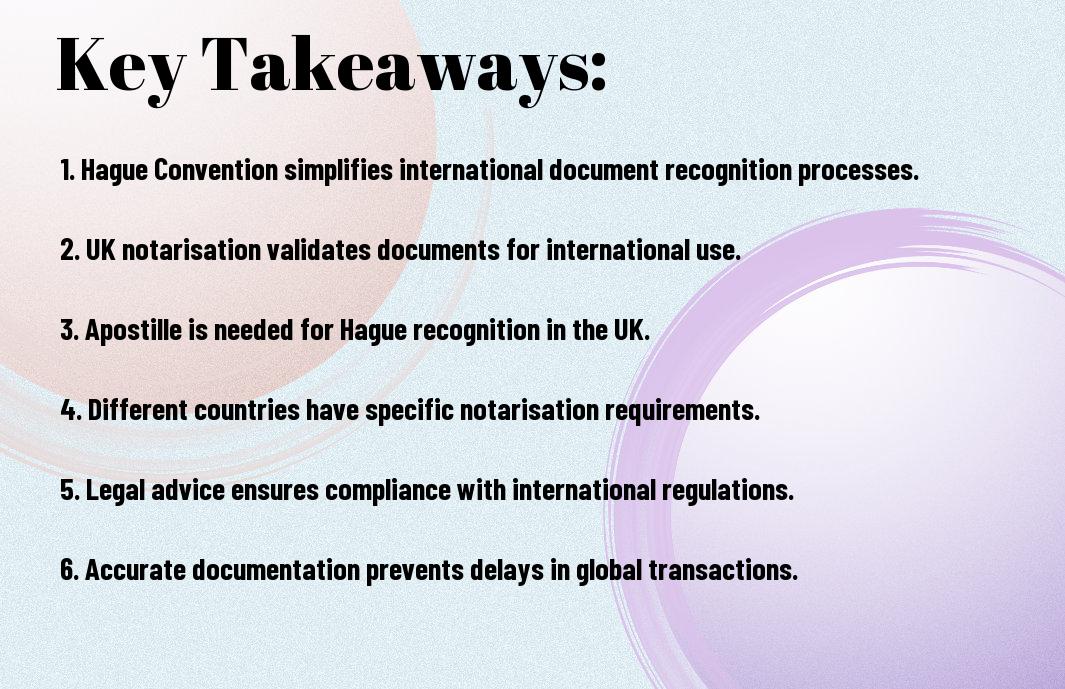You may find yourself needing to understand the legal frameworks that govern international document recognition, specifically through the Hague Convention and UK notarisation practices. This blog post will guide you through the intricacies of the Hague Convention, which facilitates the international recognition of public documents, and how UK notaries play a pivotal role in this process. By grasping these concepts, you will be better equipped to navigate the complexities of legal documentation, ensuring your documents are valid across borders.
Key Takeaways:
- The Hague Convention: This international treaty simplifies the process of legal document recognition across countries, particularly in matters of private international law.
- UK Notarisation: In the UK, notarisation is the formal act of a notary public, ensuring that documents are authenticated for use overseas, particularly under Hague Convention provisions.
- Apostille Certificate: An apostille is a certificate that verifies the authenticity of the notary’s signature and seal, allowing documents to be accepted in countries that are parties to the Hague Convention.
- Document Types: Various types of documents, such as contracts, affidavits, and powers of attorney, may require notarisation and apostille for international use.
- Legal Framework: Understanding the legal requirements involved in notarisation and the Hague Convention is necessary for ensuring that documents are valid and enforceable abroad.
The Hague Convention: An Overview
Your understanding of the Hague Convention is vital for navigating international legal processes, especially concerning the authentication of documents. This treaty aims to simplify the use of foreign public documents by ensuring they are recognized across borders without the need for further legal formalities.
Historical Context
With its origins in 1961, the Hague Convention was established to address the challenges posed by the increasing movement of individuals and documentation across borders. It arose from the need to streamline the validation of official documents among nations, enhancing legal certainty in an increasingly globalized world.
Key Principles and Objectives
Between nations, the Hague Convention sets out to promote cooperation and ensure that public documents, such as birth certificates or marriage licenses, can be easily accepted by foreign authorities. Its key objective is to facilitate international legal exchange by eliminating the need for lengthy and costly legalization processes.
Plus, the Hague Convention establishes a standardized apostille process, which serves as a certificate attached to documents to confirm their authenticity. This system not only expedites international transactions but also helps protect the rights of individuals dealing with foreign legal systems. By complying with the Hague Convention, you can ensure that your documents are recognized globally, enhancing your ability to manage international affairs efficiently.
Understanding UK Notarisation
Now that you grasp the fundamentals of the Hague Convention, it’s crucial to understand UK notarisation. Notarisation serves to authenticate your documents, ensuring they are recognized both locally and internationally. If you require US Notary services in London, it’s advisable to liaise with a qualified notary who can guide you through the process.
The Role of Notaries in the UK
At the heart of the notarisation process in the UK is the notary public, a licensed official empowered to verify identities, witness signatures, and certify documents. Notaries play a vital role in international law, ensuring your documents meet the requirements of foreign jurisdictions.
Notarisation Process and Requirements
Role of notaries also includes preparing and maintaining records of all transactions. This notation helps establish the validity and reliability of the documentation you present, providing an added layer of security and assurance.
Process for notarisation typically involves contacting a notary to schedule an appointment, during which you must present valid identification and the documents needing notarisation. The notary will verify your identity, witness your signature, and complete the notarisation with their official seal. Depending on the document’s purpose, additional legalisation may be required, particularly if the documents will be used in countries outside the UK.
The Intersection of the Hague Convention and UK Notarisation
Many individuals and businesses in the UK may seek to understand how the Hague Convention intersects with UK notarisation processes. This international treaty simplifies the recognition of legal documents across member states, while UK notarisation ensures the authenticity of these documents. Navigating this intersection can enhance the validity of your legal documents in foreign jurisdictions and ensure smooth transactions, particularly in business and personal legal matters.
Apostille and Its Significance
To authenticate your documents for international use, an Apostille is often required. This certificate, provided under the Hague Convention, verifies the origin of the document, ensuring that it is accepted in other member countries. Obtaining an Apostille adds an important layer of credibility, making your documents more widely accepted and reducing the risk of legal challenges abroad.
Practical Implications for Legal Documents
About ensuring your legal documents are recognized internationally, obtaining an Apostille and following UK notarisation protocols can save you time and resources in legal dealings. This is particularly beneficial if you frequently engage in business or personal relationships across borders, as it solidifies the legitimacy of your documents.
Implications of the Apostille process extend beyond mere legality. When you ensure your documents are properly notarised and apostilled, you facilitate smoother transactions, reduce delays, and enhance trust with international partners or officials. This foresight can be particularly beneficial in real estate transactions, business contracts, and family law matters, where the authenticity of documents is paramount. By taking these measures, you can navigate the complexities of cross-border legal requirements with confidence.
Challenges and Considerations
Unlike standard legal procedures, the process of notarisation under the Hague Convention can present unique challenges. Understanding these complexities is vital for ensuring your documents are appropriately processed. Factors such as different legal interpretations, specific requirements for each country, and potential delays can all impact the outcome. You must stay informed and prepared to navigate these intricacies to safeguard your documents’ validity across borders.
Common Issues in Notarisation
Above all, you may encounter several recurring issues during the notarisation process. Inconsistent documentation requirements among countries, language barriers, and insufficient knowledge of local laws can lead to complications. It’s important to address these factors early on to avoid delays and ensure your notarisation is valid. A thorough understanding of the specific needs of each jurisdiction can help streamline your experience.
Navigating Legal Frameworks
Below, the legal frameworks surrounding notarisation can vary significantly between jurisdictions. Familiarizing yourself with the specific laws in both the UK and the country you are dealing with is imperative for a smooth process. You may need to seek guidance from legal professionals who specialize in international law to navigate this terrain effectively.
The distinctions in legal frameworks may result in conflicting interpretations of notarisation procedures. Each country’s adherence to the Hague Convention may further complicate matters, as local laws can create additional requirements or barriers. Engaging with legal experts and reviewing the mutual recognition agreements in place will help you understand your obligations and rights, ensuring significant procedures are handled correctly to avoid potential pitfalls.
Case Studies: Applications in Real Scenarios
Not only theoretical, the Hague Convention and UK notarisation have practical applications you can observe through various case studies, including:
- 1. International adoption: Over 300 Hague Convention adoptions facilitated annually in the UK.
- 2. Business agreements: 85% of UK companies using notarised documents for cross-border mergers in 2022.
- 3. Wills and estates: 70% of expatriates rely on notarised wills to ensure recognition in their home countries.
- 4. Education documents: Approximately 60% of international students require notarisation for their qualifications.
For additional information on actions you can take, check the Notary Services for all Nationalities.
Cross-Border Transactions
After navigating the complexities of international trade, properly notarised documents can help ensure that your contracts are recognized and enforced across borders, safeguarding your interests and assets.
Personal and Family Law Matters
An effective use of the Hague Convention in personal and family law matters facilitates international custody disputes and marriage recognitions, simplifying your legal concerns in a global context.
Scenarios involving divorce, child custody, or international inheritance highlight the significance of these agreements. When navigating personal legal matters, you will find that a notarised document can provide the assurance needed for your rights to be upheld, ensuring that your family arrangements are respected in both domestic and international jurisdictions.
Best Practices for Compliance
Despite the complexities surrounding the Hague Convention and UK notarisation, implementing best practices can significantly streamline your compliance efforts. Stay informed about evolving regulations and ensure that all documents meet the required standards. Regular training for your staff on the nuances of international document handling is also beneficial, enhancing your organization’s capability to navigate these processes efficiently.
Ensuring Validity and Acceptance
Any document you present for international use must be valid and properly accepted in the jurisdiction where it will be used. This ensures that your documents meet not just local requirements but also the stipulations of the Hague Convention. Confirm that your notary’s credentials are recognized in the intended country to avoid any potential issues.
Tips for Individuals and Businesses
At every step of your document preparation process, it’s beneficial to keep the following tips in mind:
- Verify the legitimacy of your notary’s credentials.
- Ensure your documents are translated accurately where necessary.
- Consult with legal experts specializing in international law.
The knowledge of local translation requirements ensures smoother processing.
This proactive approach not only enhances compliance but also builds trust with international partners. Consider these additional tips for best results:
- Maintain a checklist of required documents.
- Schedule regular audits of your compliance procedures.
- Utilize professional services for document preparation and notarisation.
The consistency in following these practices will strengthen your legal standing in international matters.
Summing up
Now that you understand the Hague Convention and the process of UK notarisation, you can navigate international legal requirements with greater confidence. This knowledge enables you to ensure that your legal documents are properly recognised across borders, facilitating smoother transactions and communications. By familiarising yourself with these processes, you equip yourself to handle any legal complexities that may arise in your international dealings.
FAQ
Q: What is the Hague Convention, and how does it relate to notarial acts in the UK?
A: The Hague Convention, specifically the Hague Convention Abolishing the Requirement of Legalisation for Foreign Public Documents (1961), seeks to simplify the process of international document recognition. Under this Convention, documents that are issued by the authorities of one signatory country can be recognized by the authorities of another signatory country with less bureaucratic interference. In the UK, this applies to notarial acts, which are documents that have been certified by a notary public. When a notary public in the UK notarizes a document intended for use in a Hague member country, the document can be certified with an apostille, which substitutes the need for legalisation at an embassy or consulate of the receiving country.
Q: How do I obtain an apostille for my notarised document in the UK?
A: To obtain an apostille for a notarised document in the UK, you must first have your document notarized by a notary public. Once notarised, you need to submit the document to the Legalisation Office of the Foreign, Commonwealth & Development Office (FCDO) along with the required application forms and any applicable fees. The FCDO will verify the signature of the notary public and attach an apostille certificate, which confirms the authenticity of the notarisation and allows the document to be recognized in other Hague Convention countries. Make sure to check any specific requirements, as some documents may need to be presented in a particular format.
Q: Are there any limitations to using Hague Convention apostilles in the UK?
A: While the Hague Convention provides a streamlined method for document recognition, there are some limitations to be aware of. Firstly, not all countries are parties to the Hague Convention; hence, an apostille may not be recognized in non-member countries. Additionally, certain documents, such as judicial documents or administrative documents concerning the public law, may be excluded from the apostille process if they are subject to other legalisation requirements. Furthermore, while an apostille simplifies the verification process, individual countries may still have additional requirements for accepting documents, so it’s advisable to check the specific guidelines for the country in which the document will be submitted.





